Queer Lisboa '23: Sweden's "Opponent" and other festival highlights
 Friday, October 6, 2023 at 11:45PM
Friday, October 6, 2023 at 11:45PM 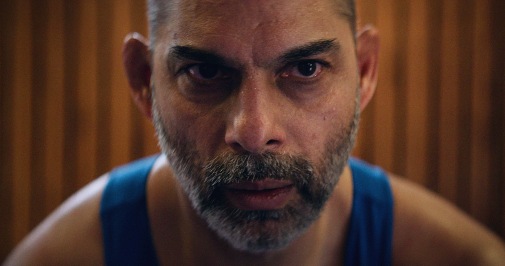
Soon after completing my Toronto Film Festival Coverage, it was time to dive into another fest experience. This turn, it was closer to home, Queer Lisboa being the oldest running film festival in the Portuguese capital, now on its 27th edition. This year, it offered a program rich in stories of marginalized identities and desires, with a particular emphasis on art intent on decolonizing our collective thought and promoting a more progressive view on the labor and lives of sex workers. There was even something for the awards nuts among us – Sweden's official Oscar submission for the 96th Academy Awards, Opponent.
To mark the occasion, let's dive into a selection of titles, starting with that Scandinavian drama, winner of a Jury Special Mention and the Audience Award…
OPPONENT, Milad Alami
My silences had not protected me. Your silence will not protect you.
This Audre Lorde quote welcomes the audience into the world of Opponent, warning of an insidious force intent on destroying us from the inside out, a corrosive for the soul. The message slashes across a milky white screen, some illusory peace soon to be ruptured by sound. It's the noise of a gym, exerting muscle and colliding flesh, where an authoritative voice demands to know a man's whereabouts. Before too long, these introductions burst into action, a frenetic long take chasing Payman Maadi's Iman as he runs for his life, adrenaline pumping into the cinematic veins with such ferocity that you don't even blink when the chaos resolves in bloodshed.
Cut to a snowy somewhere, with wolves patrolling the frozen landscape while their prey takes refuge among the human refugees. From Iran to Northern Sweden, the camera reencounters Iman, exiled with his wife and two daughters, begging a foreign government for asylum. Not that he's ever honest about the reasons that led to their escape. Officially, the family fled after false rumors of political dissidence put a target on the patriarch's back. Unofficially, the silences shared between spouses are loaded with unsaid confessions, accusations, the subterfuge of propriety keeping Iman and Maryam from ever speaking the truth to themselves and others.
That's why his wife's eyes shine with timorous judgment when the ex-wrestler returns to the world of Greco-Roman combat. The camera does nothing to dissuade us that her suspicions are unfounded, for it quickly gets intoxicated in the homoerotic possibilities of masculine bodies. A study of gazes and touch divine, Opponent contrasts the liberation of the ring with the domestic duels back home and within. In this story of a desperate man, physical violence feels somehow kinder than wars protracted through quiet resentments, touch averted and avoided, silence prevailing. At two hours, it makes for a relatively inert drama that nonetheless devastates as a character study.
Its success has much to do with Milad Alami's elegant staging, especially his devising of interludes where Iman's tale opens up to the plight of other refugees. Montages peruse the lives of shelters beyond the individual occupant, singing a song of impermanence by repeating compositions, the ghost of each inhabitant remaining long after they're gone. Moreover, the Iranian-Swedish director benefits from a magnificent movie star at the center of his narrative, relying on Maadi's skills to sustain the ever-bleaker tone and exteriorize Iman's internal collapse, his surrender to the silence. The best of it all is how neither artist is eager to sanctify the character, letting him be a tragic figure full of sharp edges, defiantly complex from running start to ominous end.
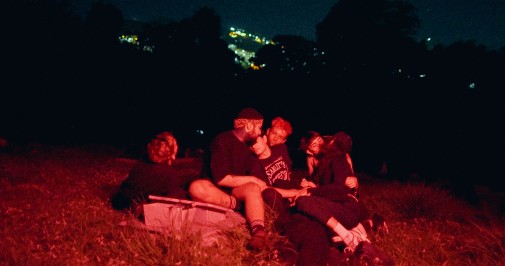
ANHELL69, Theo Montoya
Death pervades the cinema of Theo Montoya, a Colombian filmmaker who once planned on making his debut with a B-picture ghost story on the streets of Medellín. However, soon after he found his muse, they died like so many of the director's friends, a queer youth fallen to the rapacious curse of heroin addiction.
Anhell69 is an elegy of sorts, singing a requiem for that star that never was and all those of similar fate. It unravels as a funeral procession, following a hearse through the city at night, the queer scene paying witness and setting the stage for many memories, digital fragments, poems of present dolor and imagined futures. It's as beautiful as it is sorrowful, a haunting experience forever teetering on the void's edge. Film and audience grasp at hope, at cinema, to keep themselves from falling in, but maybe that wouldn't be so bad. Death need not be oblivion when it can be a restful slumber, a final ease after life's strife. At least, that's the comfort Anhell69 holds closest, over its phantom heart.
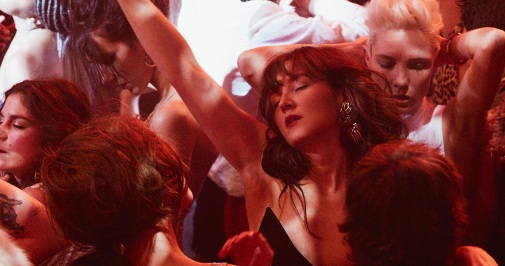
THE BEAST IN THE JUNGLE, Patric Chiha
Before Bertrand Bonello premiered his take on Henry James' The Beast in the Jungle at Venice, Patric Chiha had already tackled the same text with this Berlinale entry. More faithful than the later epoch-spanning epic, the Austrian director's vision nevertheless warps a story of 19th-century existential dread into a dislocated tale, now set in a Parisian night club at the turn of the Millennium.
Inside, from the late 70s to the early 2000s, a man and a woman anticipate a fate he feels incoming, some tremendous thing that may change it all, for better or worse. As ever, Chiha's gaze is tuned to the poetry of bodies in motion, making the background dancing as crucial as what the camera foregrounds - the world changes, unstoppable, while the central pair stays frozen in never-ending wait. A hurricane of sweat and sparkle, the gorgeously costumed film will frustrate many viewers with its purposeful repetitions. For me, however, it was another triumph for the underrated Chiha.

THE INTRUSION, Flora Dias & Juruna Mallon
The opening salvo of this Brazilian drama could be a film unto itself, brilliant enough to make it as a short about a landscape changing hands through out-of-order History. We see the Guaralhos forest across centuries, the same actors playing a wide variety of silent roles as the past precipitates into the present, wilderness usurped from its original inhabitants by European invasion. However, the main action happens today when Brazil's largest airport stands where there once was Nature, and a worker passes her days between a standstill romance and the pull of her roots. Mixing 21s century Neorealism with overt pageantry, political meditations, and a queer love story, directors Dias and Mallon propose a mutable flick. At its best, The Intrusion is able to question the promises of progress, dissect colonial discourse, and, at the same time, avoid sermon-like didacticism.

LABOR, Tove Pils
Hanna, a friend of non-binary Swedish filmmaker Tove Pils, once abandoned her Scandinavian motherland to attempt a new life in San Francisco, where she became a sex worker specializing in BDSM. Though attracted to women in her personal life, most of her clientele was composed of men, as with other colleagues she befriended in the City by the Bay.
Taking the form of a diary, Labor tells this story with astounding honesty, but it further includes testimony from other figures - a cis lesbian woman and a trans gay man whose experiences overlap and diverge from Hanna's own. Intersecting a confessional narration with more straightforward interview footage, Labor proposes a stark assessment of the profession that avoids sugarcoating while delivering a destigmatizing argument, rich in nuance and even humor. Going deeper into the film's recesses, its mysteries, one can find a lament for a lost San Francisco and a clear-eyed study on how a queer generation ages from their early twenties to their mid-thirties.
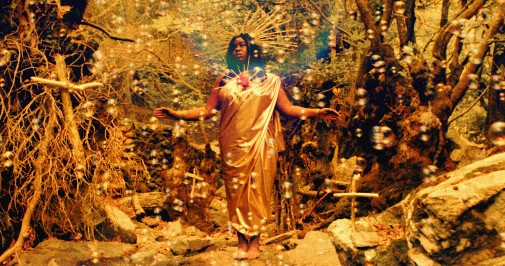
THE LIFE AND STRANGE SURPRISING ADVENTURES OF ROBINSON CRUSOE WHO LIVED FOR TWENTY AND EIGHT YEARS ALL ALONE ON AN INHABITED ISLAND AND SAID IT WAS HIS, Benjamin Deboosere
The title says it all, hinting at the playful tone of a picture intent on exposing the colonizing madness underpinning Daniel Defoe's literary classic. Indeed, Benjamin Deboosere's experiment can feel like an arthouse twist on parodical sketch comedy, restaging and reframing the original text. This is done through formal gamesmanship, lo-fi design, and grainy filmstock pastiche. It's also accomplished through something as relatively straightforward as casting, destabilizing the mythic notions of a white man 'discovering' new land by having Black actors play all the roles. The human roles, that is. At one point, there's a detour into goat melodrama, with subtitles providing the animal's dialogue – Gio, your family just wants you to be happy! All in all, it's a delightful provocation, perhaps a bit slight, but if that means it doesn't overstay its welcome, so be it.
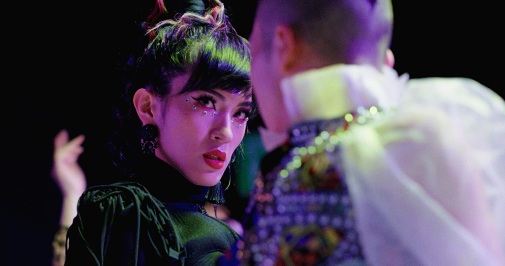
PEAFOWL, Byun Sung-bin
There's great value in having an artist showcase their art on screen instead of having a more mainstream actor attempt a second-rate facsimile. It doesn't always work, but when it does, you can get splendorous cinema, especially when the director behind the camera is attuned to that art's audiovisual specificities. Such is the case of Peafowl, starring South Korean Waacking sensation Choi Hae-jun as Myung, a trans dancer who, in the aftermath of a world tournament defeat, receives news of her father's passing.
Desperate for money to pay for gender confirmation surgery and avoid mandatory military service, she returns to her hometown. In the process, she gets roped into the funerary dances for a man she hated in life, even as he taught her the beauty of traditional Korean rites. Attempting to reconcile queer modernity and conservative tradition, Byun Sung-bin weaves a moving story that further explores the quandaries of mourning those you didn't love and the value of forgiveness for one's own sake. Anchored by Chou Hae-jun's star turn, Peafowl is a messy marvel whose dance scenes electrify the screen, often captured in beautiful long takes with scant cutting, classical technique applied to choreographed rebellion.

PORNOMELANCHOLIA, Manuel Abramovich
As Peafowl pointed its camera at a Waacker prodigy, Pornomelancholia considers the reality of the sex influencer. Twitter hunk Lalo Santos plays a fictionalized version of himself in Manuel Abramovich's moody character piece.
Wandering in and out of depressive apathy, the film starts by presenting us with the haunting tableau of a man crying on the street, his reflection the only one paying him any mind for the people around move beyond him unseeing, unbothered, unkind. After establishing this sense of melancholy, the pornographic work comes into play, jettisoning the film into a plotless meandering around naked flesh, casting calls, and ridiculous porno sets. Through it all, one feels the search for fulfillment that never comes, even as the erotic labor provides a sense of fleeting purpose, the role of a desirable object always easier to play than that of oneself - better be fantasy than reality. In the end, though, the denial of catharsis suggests the filmmakers' interest in what lies underneath fake surfaces, plundering away in search of some honesty.
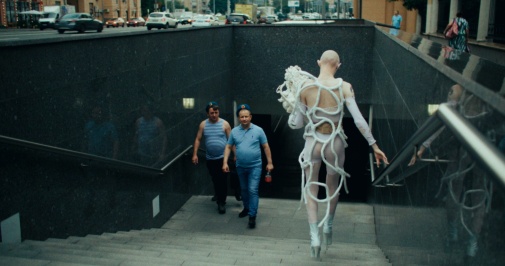
QUEENDOM, Agniya Galdanova
With the war in Ukraine raging on, it's easy to flatten the Russian population into a single aggressive force. We see it daily on the news and our feeds, another dehumanizing side of the conflict. With that rhetoric ever-present pressing on, films like Queendom feel especially valuable.
This portrait of non-binary drag artist Gena Marvin starts before the full-scale invasion in 2022, when the otherworldly performer still divided their time between Moscow and their hometown of Magadan, formerly of the Soviet Gulag. In these landscapes dripping with anti-LGBTQIA+ hate, Gena thrived in anti-conformity, expressed through simply existing as a queer body but also through a costumed apparatus. Their aesthetic is a form of activism, often attached to more traditional practices, like when Gena attends a protest against Putin styled to suggest a genderqueer spin on the Russian flag. Before such sights and their violent consequences, it's hard to resist the urge to stand up and applaud them mid-film.
Though observational, the documentary feels as untamed as its subject, often transitioning from its street-level milieu to a more heightened theatricality. It's as if the picture was mutating around Gena's chimeric presence, with Ruslan Fedotov's cinematography on hand to metamorphize the mundane into the magical.
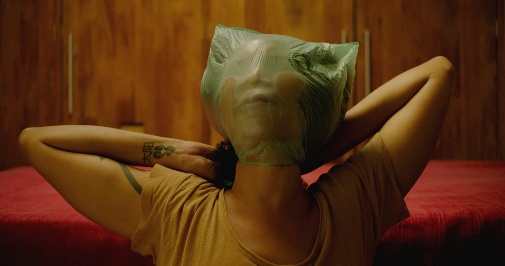
RULE 34, Julia Murat
After winning big at the 2022 Locarno Film Festival, Julia Murat's Rule 34 went on to take the first prize from the Queer Lisboa jury. It's easy to see why so many are captivated by this Brazilian drama whose very text beckons discussion, not so much a dialogue with the spectator but a trans-media tribunal where the final verdict depends on each viewer. It revolves around Simone's double life: a law student by day and cam girl by night. However, it should be noted neither the writer-director nor her fearless leading lady, Sol Miranda, are interested in the prosaic tensions that the premise suggests. On the other hand, they are keen on exploring the body's sensory needs, how one's first adventures into the realm of kink can correlate to a discussion on justice, and how debates on punitive intent can bleed into one's erotic self-regard. Rule 34 is a challenging film, alright.

SHALL I COMPARE YOU TO A SUMMER'S DAY?, Mohammad Shawky Hassan
Continuing the trend of diarist films, this Egyptian experiment rhymes the One Thousand and One Nights narrative device with a remembrance of sexual adventures, glorious orgasms, romance, and disappointments. Through staged testimony, Mohammad Shawky Hassan weaves a tapestry of desire where Arabic pop culture gets re-appropriated into queer expression, song interludes marking this oddity as a musical of sorts. The palimpsestic film, where a thousand genres converge, adds folklore to its decoupage, passing by kitsch with fearless abandon while at it. The results may not work for everyone, but they feel jolted by the purest sincerity, exposing intimate reflections so vulnerable as to be red raw, bloodied, aching to be seen. Even in the arthouse festival circuit, cinema rarely gets this personal, so when it does, it's awe-inspiring.
If you have the chance to see any of these fantastic features, don't waste the opportunity. All of them are queer gems worthy of attention.



Reader Comments (1)
MMOs are also great games for developing skills and thinking, especially Wow, in which you can come up with different tactics for fighting monsters while completing mythic+ carry, depending on changes in the balance of the game. mythic+ carry